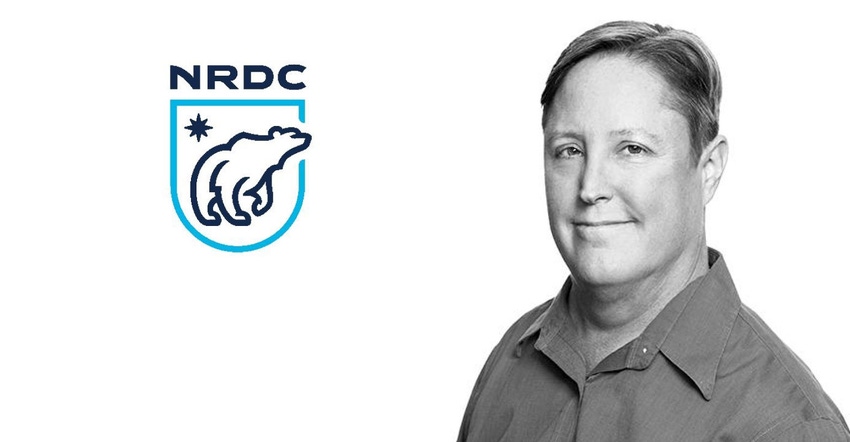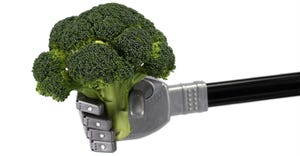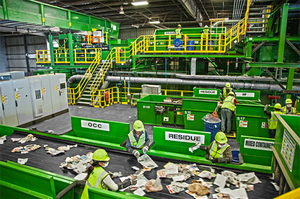Thinking of new strategies and solutions to reduce waste is always top of mind for Hoover who has dedicated her 30-year-career to waste prevention including the last 16 at NRDC.
August 20, 2020

The whole action of throwing something away – whether solid waste, food waste or any kind of waste – is a complete man-made concept because in nature there is no such thing as waste so, for Darby Hoover, senior resource specialist for food waste initiatives at the Natural Resource Defense Council (NRDC), she has made her whole career about figuring out how to deal with waste.
During college, Hoover lived in a hippie co-op and worked at a recycling center along with some friends where she became very engaged with the idea of waste.
“There was one time I was going to pick up a recycling bin and I saw a guy walking toward the recycling bin with a Styrofoam cup in his hand and I thought, ‘don’t put that in the recycling bin, it’s very clearly marked. You know that doesn’t go in there.’ But of course, he finished his coffee, disengaged from it and dropped it right in the recycling bin,” said Hoover. “And I thought that’s so interesting – I watched somebody embodying the phrase, ‘throw away.’ Which was, this guy had this thing that was so important to him – the coffee—and then when it became an empty cup, he just couldn’t get rid of it fast enough. It no longer felt connected to him and he didn’t even see it as something that was related to him in any way.”
“Waste is something that we’ve managed to create as humans and in natural systems something dies and it becomes feedstock for something else, but we’ve managed to create materials that are so complex and there are so many of them that we can no longer rely on Earth’s natural systems to take care of it, but we haven’t really updated our mindset to take that into account. So, we’re still throwing things away even though it should be abundantly clear to all of us by now that there is no ‘away,’” said Hoover.
Now 30 years into her career with the last 16 of them working for NRDC, Hoover has made strides in helping communities, businesses and organizations understand waste generation and how to reduce it.
“I’ve worn a lot of hats at NRDC – everything is waste related. I worked on sustainable paper production issues, I’ve worked on marine plastic pollution, and for 10 years I worked on our sports and entertainment greening initiative,” said Hoover.
The greening initiative was an industrywide effort for professional sports leagues, teams and venues to adopt greener practices under a number of different areas, she said.
“We created a lot of different materials and we got all the major commissioners of the major sports to endorse the initiative and had their teams sign up to say that this was important and we helped create an organization called the Green Sports Alliance which is carrying on that work now,” said Hoover. “From the entertainment side, we worked with Oscars, Grammy’s, Broadway and other entities on helping them make sure that their events were greener and making sure that they adopt good practices across the board – whether that relates to environmentally preferable purchasing of more energy efficient systems or you know recycling at zero waste.”
For the last five years, Hoover has been on the food waste team at NRDC which she says is “super exciting.”
“Having been engaged in waste issues for so long and in particular, zero waste and waste prevention work, food waste really gives you the opportunity to work on waste prevention in a way that can be challenging with other materials,” she said.
“People really get what it means to waste food; everybody wastes food, everybody’s had that experience and in the lot of cases, if you help educate people about different strategies for buying food, for storing food, for preparing food, and for discarding food. There are a lot of ways to avoid wasting food so it’s exciting because we can really get at some of those strategies that really do happen higher up in the food waste hierarchy.”
In 2015, the United States Department of Agriculture (USDA) and Environmental Protection Agency announced the first ever domestic goal to reduce food loss and waste by half by the year 2030. Since then, there has been an increase in large corporations announcing their own sustainability and waste reduction plans with goals that align with the 2030 target but Hoover said this increase was already on the rise.
“NRDC issued a report called Wasted, that originally came out in 2012. I think we were the first to really publicize the figure, that up to 40 percent of food in the U.S. is going to waste, and that message was received loud and clear by a number of organizations, governmental, private sector, etc. and I think people really heard that and really got how egregious that is and how especially when you know roughly one in eight Americans is food insecure then how on earth are we living with ourselves wasting so much food?” said Hoover. “So, I think that really helped galvanize things and starting there we saw a whole lot of other nonprofits and other organizations become engaged in researching and educating around food waste. We saw a whole lot of companies and governments adopting policies and strategies to address food waste and we saw consumer awareness rise partly as a result of our Save the Food consumer campaign which you can find at savethefood.com.”
Hoover’s team has also produced a variety of reports, research, tools and more that municipalities, organizations, venues and other waste generators can utilize to reduce waste, including the Food Matters reports that were published in 2017.
“I’m really happy to have been part of all of that. I would say one thing in particular that I was really happy to get to do was to oversee our Food Matters project creating a report on estimating how much and what types of food are going to waste in three different cities – Nashville, Denver, and New York,” said Hoover.
While the outcome of the project is one of Hoover’s proud career achievements, it did come with its share of challenges. She said there have always been a lot of people who wanted to measure food waste at the city level but there just hadn’t been a lot out there on how to do that with the exception of WRAP in the United Kingdom and a few other entities.
“I know it doesn't sound that sexy to be part of measuring something, but if we don't know what we're generating how are we going to know what strategies we need to employ to tackle it? So getting a handle on how much is even out there and where is it coming from is a very critical component to: and now what are we going to do about it?”
Most recently in August 2020, NRDC expanded the Food Matters project and launched a regional initiative in the mid-Atlantic and in the Southeast, said Hoover, where they are taking the lessons that they’ve learned in the deep dive one-on-one engagement with other cities and expanding that to a regional approach for cities in a similar region to learn from one another.
Hoover will go into more detail about her work next month during her panel session for the Waste360 Food Recovery Forum online on September 15, 2020, co-located with WasteExpo Together Online.
“I will be discussing a whole batch of different tools that we recently created at NRDC that are specifically designed to help cities tackle different elements of adopting food waste strategies,” she said.
Hoover is no stranger to speaking at conferences. She said she first started attending conferences and noticed a need for more sessions about waste prevention and not just waste management so she got involved.
“When I started at NRDC 16 years ago or so, I looked for opportunities to speak at conferences where it was going to be something new, where I wasn't preaching to the choir. I would say there's a little bit more preaching to the choir now that there's so many more choir members. We all need to update one another on what the new thinking is and what the new strategies are in the new tools so I get excited to go and hear about what other tools and strategies somebody else is creating and I want to share what we've been working on,” she said.
Hoover’s job entails working primarily at all levels of the food waste hierarchy so she is always working to find solutions to prevent food from going to waste and part of that is keeping a close eye on the market, trends and thinking outside of the box.
“I love that the idea of zero waste got created. I especially like that it makes people have to have a conversation because almost nobody thinks we can actually get to zero waste but the conversations you have when you’re discussing how close you can get to it are the ones I think where you get a lot of creativity and a lot of new ideas and a lot of motivation to keep going and not just say OK great we hit a 75% diversion target and we're done,” she said. “I would like to see us move away from the concept of diversion altogether which I think sets up a system where you're thinking something either is in the landfill or it's in the not-landfill. It doesn't necessarily steer us toward reducing waste and reconceptualizing waste.”
“So these concepts like circular economy, zero waste, all these ideas that basically say, wait we did create this idea of waste as humans, it doesn't exist in nature, why don’t we design our systems to make sure that something that is no longer needed in a particular process or by a particular entity is usable elsewhere? So, I think that's promising,” said Hoover.
“I hope that the direction that we're needing to take as a result of having to rethink our recycling systems because of the restrictions from China and so forth mean that we will think harder about what we're even introducing into our Commerce and how to ensure that anything that we introduced into the economy can stay there for a while in the circular economy concept and not necessarily be a one way trip from consumer to landfill,” she said.
And Hoover doesn’t just mean food waste by itself, packaging also needs to be considered.
“I think that food waste and packaging waste are intertwined and sometimes you trade off one for the other. For example, you’ve got a lot of packaging trends that have been moving towards smaller sized packages, more customized, that maybe including more than one food item like you’ve got your chip in your dip in the same package or something like single-serve packages so that creates more packaging but the trade off is probably less food is wasted because you’re creating smaller serving sizes and letting people really customize what they need,” said Hoover.
“I think the trends in both food waste and packaging waste should be, ‘let’s just try to look for ways we can produce less of it in the first place,’ before we get to ‘how to manage what’s there.’ But looking all along that chain I think there are some promising developments and packing is one potential there,” she said.”
The affect of the COVID-19 pandemic on food waste is also something Hoover is interested in but with the pandemic still so new and ongoing there isn’t enough robust data yet to make a report.
“I think we know anecdotally and through some data, a lot of the consumption and preparation of food is shifted to the residential sector from the restaurant sector since people are home, they’re buying food and cooking food on their own. The sales of meal kits have gone way up,” she said, but also the number of people who are now entering the emergency food system who may or may not have been engaged in that before has increased.
“You're seeing people engaging with food perhaps in a different way than they’re used to or more frequently than they’re used by cooking at home and then I think we've also seen shopping behaviors where people are starting to think about OK maybe I don't want to go to the store as often as I ordinarily would so I'm going to really think ahead and do some menu planning and shopping list generating which tend to help reduce food waste if people are really planning ahead what they're going to eat so it will be interesting to see what that means in terms of food waste generation because it could go either way,” she said.
Reflecting on her 30-year career, Hoover said she was lucky enough to embody the “do what you’re passionate about” mantra but her advice for young graduates or people just starting out in the waste industry is to “pursue what makes you curious.”
“I don't know that everybody finds passion in their career. I was lucky enough to figure out that I am passionate about waste, which I know is peculiar but I also know that this audience will understand that and so you know I found my niche and I found my group of people who have that same shared odd passion but I would also say that I got there by looking at things that made me think, that again I thought why do we have this idea of waste and I've started pursuing something that made me intellectually curious and so figuring out what you want to know more about and figuring out ways to know more about that,” she said. “And then the other piece of advice-- just talk to everybody that you can. Do informational interviews, go to conferences, join groups, volunteer for groups if you can, but learn more about what's being done and figure out where there's a need and figure out where you have the skills and figure out where you have the interest.”
You May Also Like


